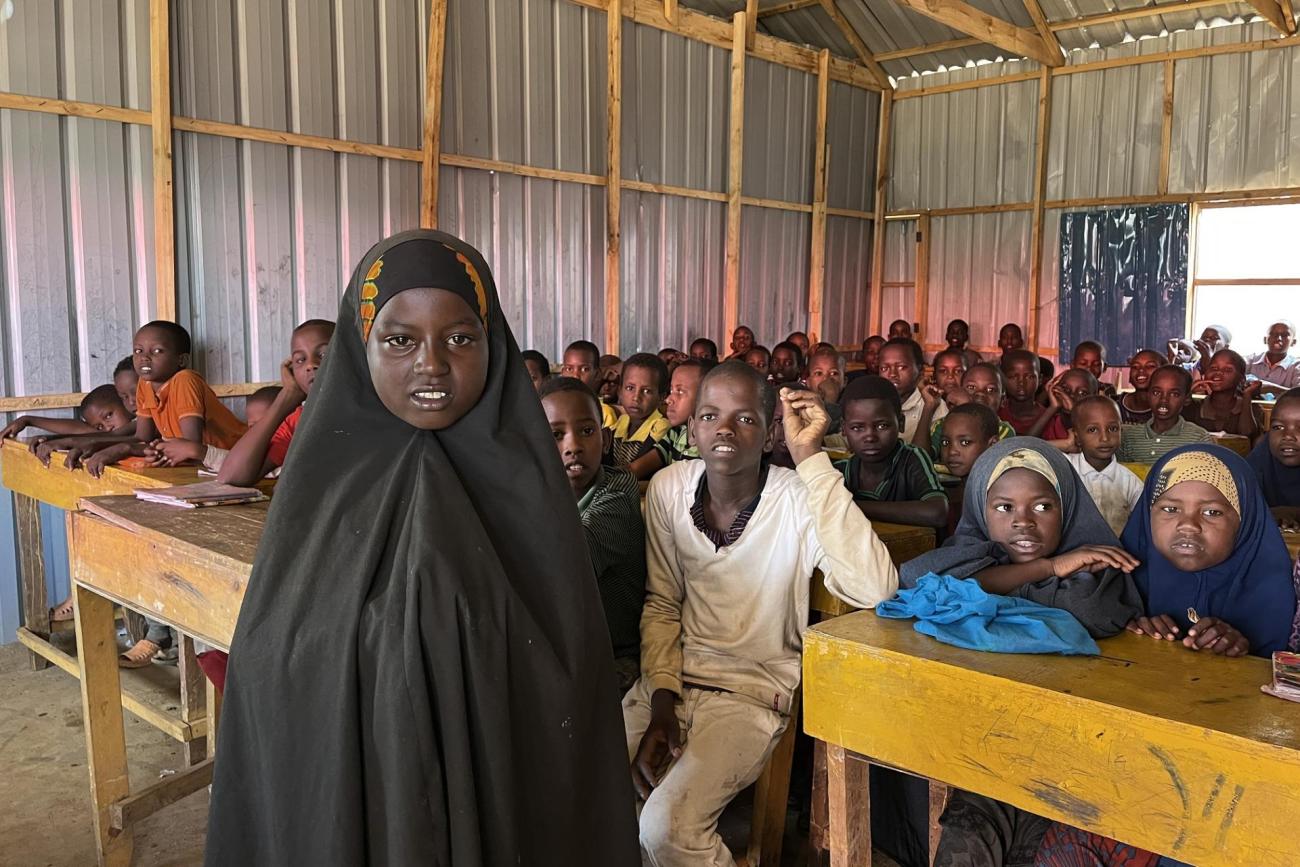Children access education for the first time in their lives at UNICEF supported schools in Somalia

In a cruel twist of fate, rural out-of-school children now displaced by drought are finally able to learn.
Baidoa, Somalia: The chorus of young voices rises in cadence, a sweet melody of six dozen children, singing the letters of the Somali alphabet – that they just mastered one week ago.
Standing before the blackboard and leading this rustic symphony at the Mustaqbal Integrated Primary School is a shy 10-year-old girl named Farhia Abdi Moallim.
“I am so happy to learn,” says little Farhia, “I want to be a teacher when I grow big, so I can teach children in my village who cannot go to school.”
Her eyes twinkle with glee, radiant under the all-black abaya robe that covers her whole body, leaving only her face exposed, glowing like the hopeful and happy sun after a dark summer storm.
This a hopeful beginning because all the children sitting on the benches behind her, had never seen the inside of a classroom until four weeks ago.
An ongoing drought has ravaged Somalia for the last four years, drying water-wells, killing crops and livestock, and displacing more than a million people to urban centres like Baidoa in South-West Somalia; where they live in camps for internally displaced persons (IDPs), surviving just on humanitarian aid.
This is on top of the 2 million people displaced by the conflict that has battered Somalia for more than three decades; and also includes IDPs from the famine of 2011 and the drought in 2017.
All these factors have had devastating consequences for the children of Somalia. It heightens the learning crisis in a country with more than 3 million children who were not in school, even before the COVID-19 pandemic in 2020.
Alongside other humanitarian interventions, UNICEF and education partners are working with the Ministry of Education to provide learning opportunities for children displaced by drought and conflict.
UNICEF/Giri
13-year-old Abduwali says he knows all the alphabets.
In another classrooms at the end of the same one-roofed structure, we meet 13-year-old Abduwali Derow Aden. He walked for two days with his parents and six siblings to Baidoa and has been attending Grade 1 since the school reopened six weeks ago.
“I know all the alphabets now,” he says proudly, a big smile on his face. “I like learning mathematics and I like my school.”
At the Mustaqbal Integrated Primary School, UNICEF is working with local partners to increase the capacity of the school to handle the influx of new children.
UNICEF/Giri
Principal Habiba says they will teach all the children who come to their school.
“We have more than 1,500 students, and we are receiving 3 to 5 new students every day,” says Habiba Ibrahim Aden, the Principal and one of the founding members of tiny primary school.
Rows of boys and girls squat on the floor just outside the classrooms, a patient look on their faces. “These are children who have just arrived in the last week. Although we have no space, we cannot turn them away - we will teach them in shifts,” she says.
Established seven years ago, this school has expanded rapidly in the last two years, with children of IDPs who have converged on Baidoa to escape the conflict and drought.
UNICEF is supporting the school through education partners to ensure that all children receive basic education. This support includes teacher training, provision of furniture and teaching materials, and financial incentives for teachers.
With funding from the GPE Accelerated Learning Programme, UNICEF and World Food Programme (WFP) are also supporting a school feeding programme, whereby children receive two meals a day.
UNICEF/Giri
Fatuma says she likes learning about science.
“I like my school and I want to learn,” says 12-year-old Fatuma Noor, another girl in Grade 1. “I have made many friends here, and science is my favourite subject.”
To handle the large number of students, the schools operate in two shifts: one from 8:00 am to 12:00 pm, and the afternoon shift from 1:00 pm to 4:00 pm.
Habiba the principal, says that none of the children leave school before the end of the school day. “The children enjoy coming to school, and thanks to our donors we provide them with meals, and they are more focussed in the classroom,” says Habiba.
As part of the response to the ongoing drought in Somalia, UN partners including UNICEF and other NGOs are accelerating delivery of humanitarian supplies and services including food and shelter, health, nutrition, and water and sanitation to mitigate the worst of this climate induced disaster.
Providing these children an opportunity to learn is a major concern for UNICEF. Alongside the existing support from the Global Partnership for Education, UNICEF will also roll out an Education in Emergencies programme in Baidoa soon, specifically targeted at children of IDPs.
Link to the original story.


